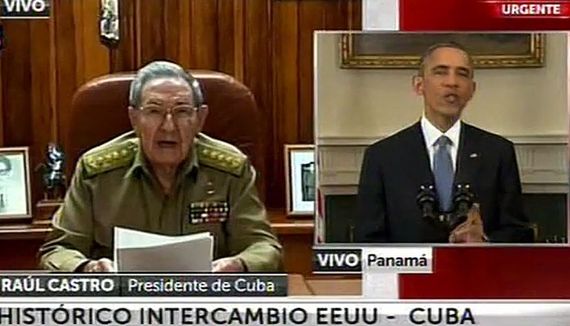In moving to right years of failed economic and political policies towards Havana, Mr. Obama has breathed new life into American global stewardship and resurrected the narrative of him transcending stasis, complicated histories, and failed policies, to seek change. Today was a victory for the defenders of global institutions, a reaffirmation of American democratic values, and an acknowledgement that past mistakes have been made.
Famously, American politicians avoid admitting errors; even at the slightest hint of regret on former misguided policies, Mr Obama has been criticized as an apologist by opponents. The eight years of the Bush administration post-9/11 constituted a sustained exercise in trial and error as we mounted an unprecedented global war on terror. Errors, omissions, and mistakes were bound to occur and they did. Yet, never has the contrast been so bare between our country's major political parties than today: on the one hand, a defiant Dick Cheney recently providing voice to unapologetic neoconservatives in the aftermath of the CIA torture report; and on the other, a reflective, sitting American president admitting to a global audience that our policies have not worked and are in need of revision. American reflection on a global stage - this rarely occurs and should be celebrated as much as the change in policy itself, since both signal our progress towards a more compassionate and enduring hegemonic power.
No longer accountable to a fickle electorate, Mr Obama is freer than ever to navigate global diplomacy on his own terms, and the past twenty-four months have reflected this autonomy. The opening of Myanmar, the Iran nuclear deal, openly disagreeing with Israeli leadership, resetting relations with Latin America on the heels of immigration reform, and now Cuba. All of the above policies have been rooted in the pursuit of fairness and equality for all. Though Naypyidaw, Tehran, Mexico City, and Havana have varying levels of geopolitical clout, we likely will not see significant economic gains as a result of robust bilateral diplomatic relations. Idealism once defined the foreign policies of great American presidents like Woodrow Wilson; yet, ever since the Great World Wars, visions of pursuing diplomacy on moral grounds have been castigated as utopian. The cynics among us say that every country ultimately acts in their own self-interest; this realist thinking has defined American foreign policy for the last 90 years.
That changed today. The Obama doctrine is revolutionary because it espouses a diplomacy based on ideals and utopian aims of promoting democracy through cooperation and dialogue. Neoconversatives may view that as weak, realists may castigate Mr Obama as naive and compromising our national security, and cynics may choose to be untrustworthy of our longtime adversaries.
Yet, Mr Obama is the standard bearer for progressive idealism, which is a commitment to selfless reforms. His is the first presidency of the soft-power generation, where investments in infrastructure and global health have outpaced growth in defense spending. Though history will ultimately be his biggest defender or detractor, there is no denying Mr Obama's activism and bravery, particularly today and particularly given the situation. Our Cuba policy was simply unjust, and though Americans will likely not stand to gain any material benefit from restoration of full diplomatic relations with Havana, Mr Obama preferenced virtue over expedience. In his waning years, he has, rather poignantly, become the leader we all hoped he would be from the outset.
